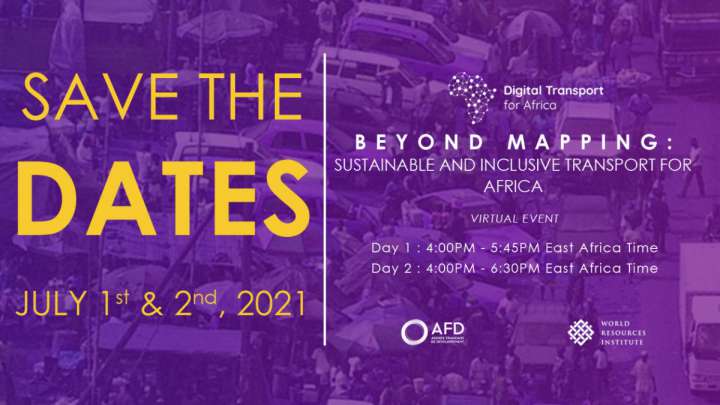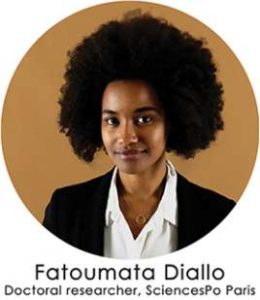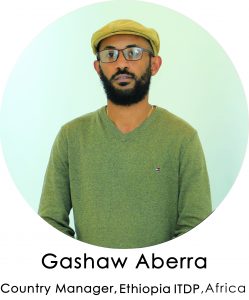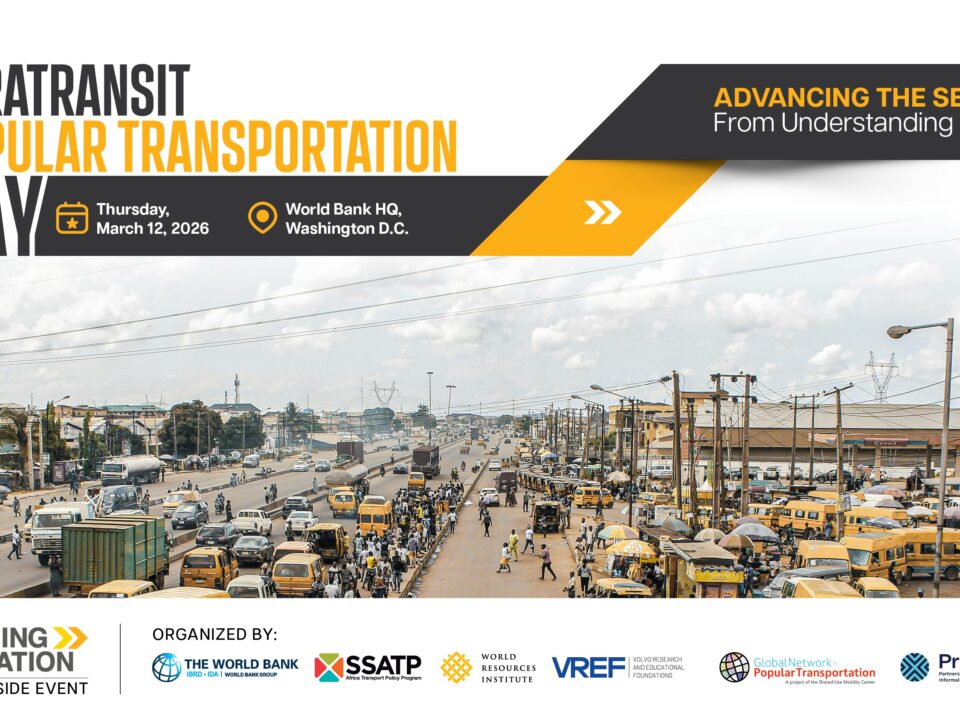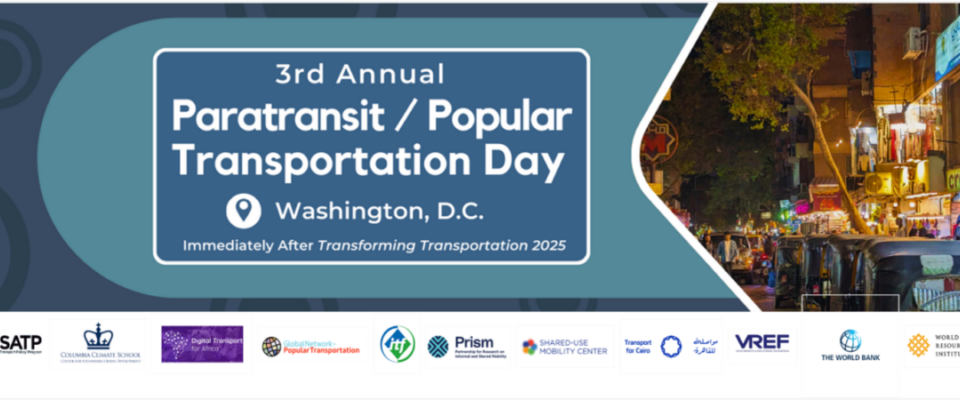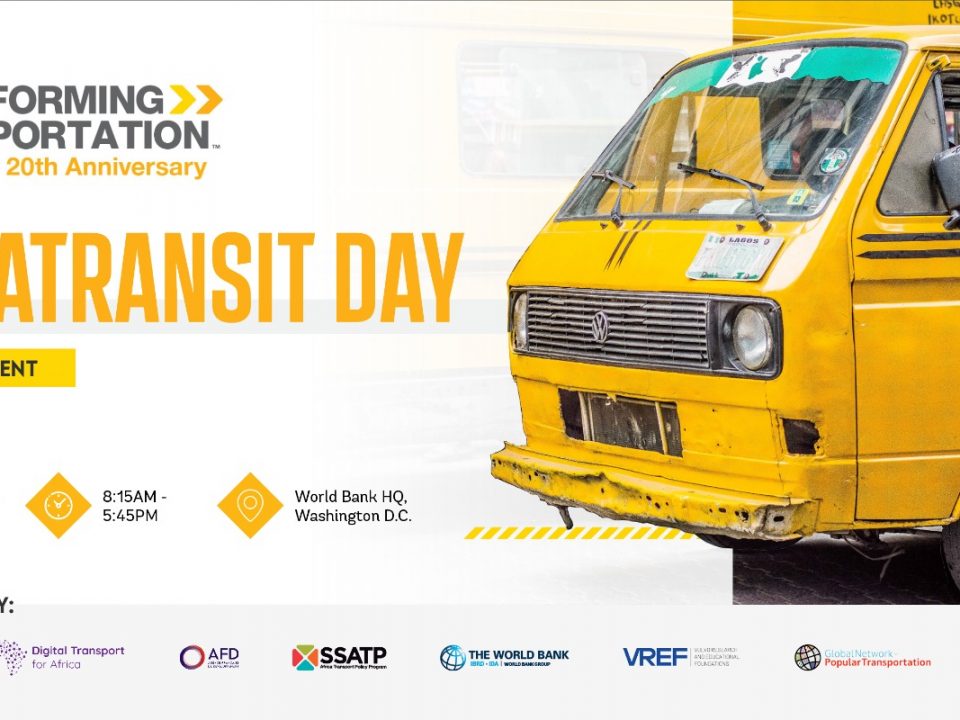
Chatting Bus Data with MobilityData
17 May 2021
An Analysis of Paratransit Services in African Cities Thanks to Digitaltransport4africa's GTFS Open Data
10 August 2021Please join WRI and Agence Française de Développement for
Beyond Mapping: Sustainable and Inclusive Transport for Africa
July 1, 4pm – 5:45pm East Africa Time // July 2, 4pm – 6:30pm East Africa Time
DigitalTransport4Africa is a collaborative digital commons and global network that works to scale up and support urban mobility projects through open standardized data, open-source software and peer-to-peer knowledge sharing. It provides support for government, tech companies and civil society actors to map city transit networks and foster ecosystems and skills that enable cities to leverage data for critical transport improvements.
Funded by Agence Française de Développement (AFD) and led by WRI, is now scaling up efforts in data collection, mapping, analysis and capacity building with the aim of reaching 10-15 additional cities across Africa. The platform is also moving beyond mapping just data on public transport in cities, but seeks to inform planning, creation of tools, and meaningful research on actions to improve sustainable mobility. The COVID-19 pandemic has only heightened the need for resilient mobility systems that meet the needs of the underserved and vulnerable. The partnerships possible by leveraging open data can create a regional movement for better transportation across Africa.
We aim to strengthen local data ecosystems and city capacities to utilize standardized data for improved planning and implementation of sustainable, accessible mobility – particularly among informal and paratransit systems. We also aim to help cities and countries measure progress towards the Sustainable Development Goals, as SDG 11.2 calls for “safe, affordable, accessible, and sustainable transport systems for all” and parallels other global targets to reduce air pollution and decarbonize the transport sector.
We hope you can join us on July 1 and 2 to learn more about how to collaborate using the #DigitalTransport4Africa platform
- City leader? Learn how to leverage the power of open transit data to inform policy and find new solutions.
- Researcher? Share your mapping and digitizing efforts with new audiences and learn what others are doing.
- Innovator? Discover new users and applications for your ideas and share your experiences with others.
Click here for Event Agenda
REGISTER FOR DAY 1 REGISTER FOR DAY 2
Speakers
Day 1 – July 1, 2021
09:00 AM – 10:45 AM ET // 04:00 PM – 05:45 PM EAT
Day 1 Event Video
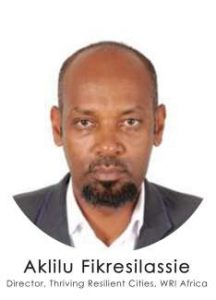
Aklilu has more than 16 years of professional leadership and technical experiences in the field of Urban Development and Management as well as managing non-governmental programmes. Prior to joining WRI, Aklilu spent 7 years at United Nations Human Settlements Programme (UN-Habitat) as a Programme Manager, representing the agency in Ethiopia. while working with the UN-Habitat, Aklilu has successful represented the agency in the United Nations Country Team and played a key role in position the urban agenda in the UN joint plans/programs (UNDAF/UNSDCF) and supporting the Ethiopian Government’s endeavor towards Sustainable urbanization through provision of technical support and implementation of several projects. He also worked with UNDP in South Sudan as Planning Specialist and team leader. Further, Aklilu led the bureau of Finance and Economic Development, managing government, bilateral and multilateral programmes.
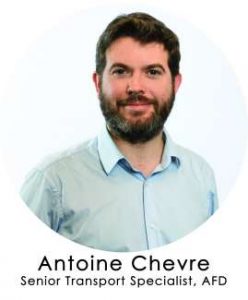
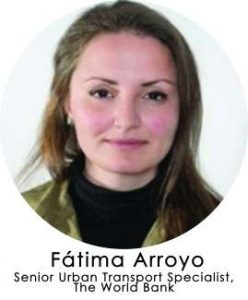

Through his personal and professional cultural experiences, he has gained understanding of the cultural intricacies, which are a factor in his past success. Frederic joined the TUMI team in May 2018 and is working hard to support the successful execution of projects and advancement of Sustainable Mobility Projects.
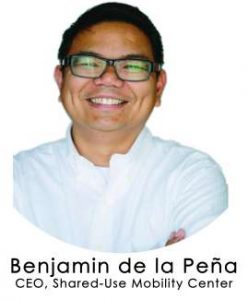
He was the Chief of Strategy and Innovation for the Seattle DOT where he worked to prepare the agency and the city for institutional and technological change. He introduced agile methods to SDOT and initiated the department’s lean transformation. Benjie and his team drafted Seattle’s Transportation Information Infrastructure Plan and the New Mobility Playbook.
Benjie serves on the boards Project for Public Spaces, and Gehl Institute. He recently served on the advisory committee for the Roddenberry Prize. He served on the advisory committees for L.A.’s Transportation Technology Strategy, the Mobiprize, and Cooper Hewitt Museum’s The Road Ahead: Reimagining Mobility. He’s worked on urban development issues that cover technology, transportation, and informality. His ideas have been featured in Citylab, Atlantic Cities, Next City, FutureEverything, and TED City 2.0.

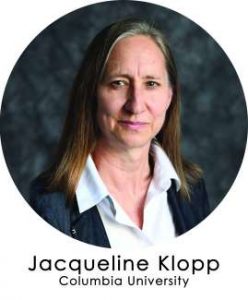
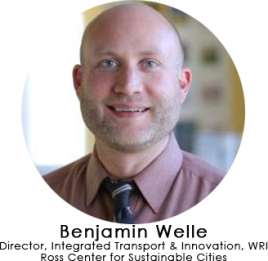
Ben’s work includes leading global research and projects, particularly in the areas of public transport, minibus services, mobility planning, access to opportunities, new mobility and innovation, traffic safety, walking & cycling, and public space. Prior to this role, Ben was Senior Associate for Urban Mobility at WRI Ross Center for Sustainable Cities, working on many of the same issues. Prior to working at WRI, he was assistant director of the Center for City Park Excellence at the Trust for Public Land in Washington, D.C., researching and consulting on city parks, public space, green infrastructure, transport planning, and related economic impact.
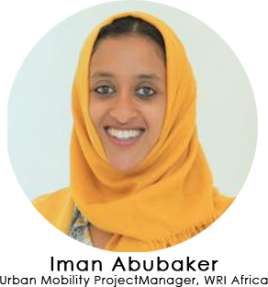
Prior to joining WRI, Iman worked as a consultant for SYSTRA, an international engineering and consulting company. She held internships at the Institute for Sustainable Development in Addis Ababa and Ethiopian Environmental Protection Authority.
Day 2 – July 2, 2021
09:00 AM – 11:30 AM ET // 04:00 PM – 06:30 PM EAT
Day 2 Event Video
Session 1 09:05 AM – 09:35 AM ET
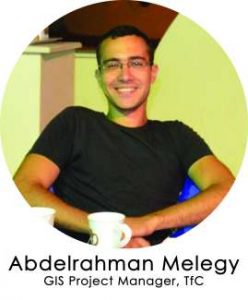
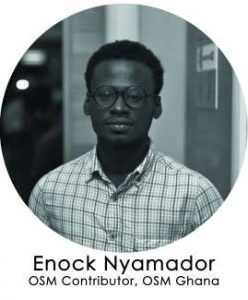
He has worked on AccraMobilie3: mapping paratransit “trotro” routes in Accra, Ghana into OpenStreetMap; the Wikipedia of maps, and support related transport mapping projects across Africa.

Rafa received the 2017 Lee Schipper Memorial Scholarship from the World Resources Institute (WRI). More recently, in 2019, his work received the award for best PhD thesis in transportation by the American Association of Geographers (AAG) and the Young Researcher of the Year Award by the International Transport Forum (ITF/OECD).
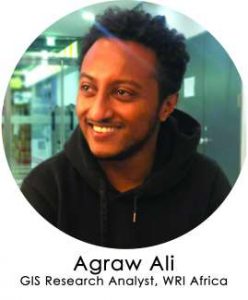
Prior to joining WRI, Agraw worked as a research associate in a laboratory at the University of Seoul. Before that, He worked at the Addis Ababa Science and Technology University as an assistant lecturer. In addition to that, he has participated in various GIS, urban planning and design projects in Ethiopia.
Session 2 09:35 AM – 10:05 AM ET
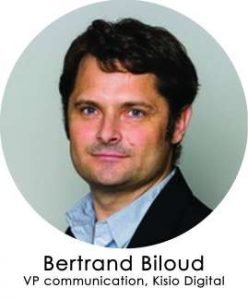
Bertrand Billoud works for Kisio Digital, the digital subsidiary of Keolis Public Transport operator. Kisio Digital provide Navitia open source platform, as a MaaS enabler dedicated to travellers information, intermodal trip planner and mobility data management. As the Communication Marketing Vice-President, he’s in charge to develop links in Navitia community and strengthen relations with Kisio Digital stakeholders, as a human connector. He promotes commons around mobility and digital services, creating value leveraging mobility open data with www.navitia.io API. He’s also committed to developing open innovation with Navitia Lab (white label open innovation platform), as an open transport tool box for developers, made with API, mobile SDK, widget, API console and good quality datasets.
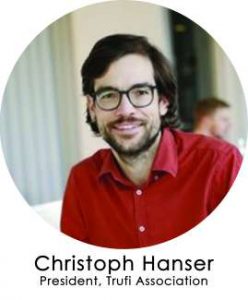
Christoph is President of Trufi Association, an NGO that supports public transport worldwide with digital solutions. He is based in Germany but previously lived in Bolivia where he saw the necessity of making informal and semiformal transport more transparent for people. This helps people to better and easier use public transport in all its options.
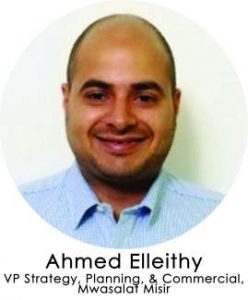
Elleithy is a subject matter expert on adopting tech-based operational solutions to resolve productivity and optimization challenges in the transport industry. He currently holds the position of VP commercial department at Mwasalat Misr SAE, where he served as Chief Operations Officer since 2018. Mwasalat Misr the first public transport operator to bring true smart urban mobility to Africa. He is currently accountable for the end-to-end development of efficient, water-tight operational modules which output much-needed scalable, reliable, premium public transport service for people moving around Cairo daily. Elleithy is specialized in Industrial Engineering with a focus on Operations Research, Network Planning, and Logistics Management. He also holds a Lean Six Sigma Green Belt. Subsequently, he has built years of hands-on experience in the fleet and transport management fields.
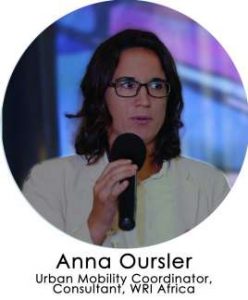
Anna is a certified Urban Planner and Architect with ten years of international development experience. She specializes in managing projects at the intersection of planning, architecture and engineering, and has worked at multiple scales of governance in Uganda, Tanzania, Zambia, Kenya and the United States.
Anna holds a Master of Science in Urban Planning and Master of Architecture from Columbia University, a Post-Graduate degree in Urban Management from the University of Nairobi and Bachelors of Arts from the University of California, Berkeley.
Session 3 10:15 AM – 10:45 AM ET
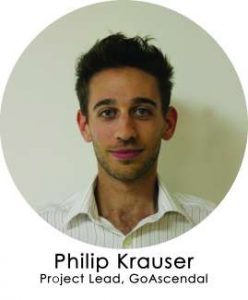
Philip is a Transport Engineer with 10 years of product development/production support experience. He has been involved with the ground-up development of heavy-duty road legal vehicles for the North American Market, the development of systems to improve assembly line efficiency, cost reduction initiatives, operator/service manual development, vehicle legal compliance assurance, and safety recall campaigns management.
He has developed a Python coded GIS based inclusionary housing planning support system, intended to aid decision making at both policy development and implementation levels, by allowing evaluation of various spatial factors which impact on the financial viability of inclusionary housing developments (specifically, in the context of urban South African environments).
Currently, he is project managing the development of the GoAscendal Africa Urban Mobility Observatory, an FCDO funded research project, which aims to establish new mobility data collection techniques using existing, and therefore affordable, mobile technology and infrastructure, in six African cities.
Philip holds a Bachelor of Science in Engineering in Electro-Mechanical Engineering (University of Cape Town), and a Master of Science in Engineering, specialising in Civil Engineering – Transport Studies (University of Cape Town).
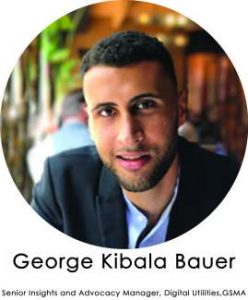
George Kibala Bauer is Senior Advocacy and Insights Manager in the Digital Utilities programme, which supports urban resilience in low- and middle-income countries by enabling access to essential utility services through digital solutions. His responsibilities include developing and managing strategic partnerships, conducting research on basic service provision in the context of rapid urbanisation in low- and middle-income countries, disseminating insights and best practices, and representing the programme at a range of external events. Prior to joining the GSMA, George gained experience in economic research, development finance, consulting, and government affairs. George holds a MSc in International Economic Policy from Sciences Po Paris, a BA in Economics from McGill University, as well as certificates on infrastructure finance, impact evaluation, and urban planning.
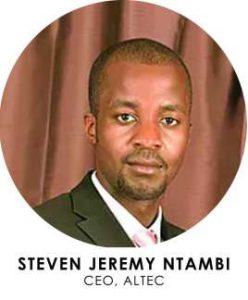
Business and Technology pacesetter with 10+ years of success strategizing and leading innovations and organizations at the brink of change and growth. History of leveraging existing and emerging technologies, uncovering opportunities, and directing trailblazing strategies to improve operations, develop leading-edge products, and increase marketability for forward-moving organizations. Deep expertise in management strengthened by intellectual curiosity and grounded in real-world technical experience, providing the foundation for next-generation ideas, development, and implementation. Focused on value-creation, innovative products, solution-based offerings and novel models that fully realize potential of ideas, teams, skills, assets, networks, products, and services
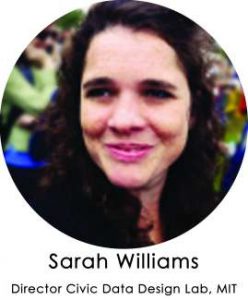
Sarah Williams is an Associate Professor of Technology and Urban Planning at the Massachusetts Institute of Technology (MIT) where she is also Director of the Civic Data Design Lab and the Leventhal Center for Advanced Urbanism. Williams’ combines her training in computation and design to create communication strategies that expose urban policy issues to broad audiences and create civic change. She calls the process Data Action, which is also the name of her recent book published by MIT Press. Williams is co-founder and developer of Envelope.city, a web-based software product that visualizes and allows users to modify zoning in New York City. Before coming to MIT, Williams was Co-Director of the Spatial Information Design Lab at Columbia University’s Graduate School of Architecture Planning and Preservation (GSAPP). Her design work has been widely exhibited including work in the Guggenheim, the Museum of Modern Art (MoMA), Venice Biennale, and the Cooper Hewitt Museum. Williams has won numerous awards including being named one of the top 25 technology planners and Game Changer by Metropolis Magazine. Check out her latest exhibition, Visualizing NYC 2021, at the Center for Architecture in New York City.
Session 4 10:45 AM – 11:15 AM ET
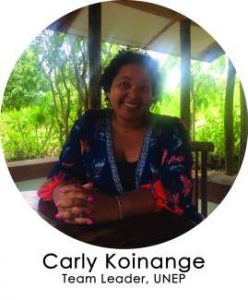
Carly manages the UNEP team for Active Mobility, Digitalisation and Mode Integration working with countries around the world to decouple mobility from increasing emissions.
Carly has been working in the field of sustainable mobility for almost fifteen years in the areas of active mobility, road safety, bus rapid transit, congestion charging, low emission zones, bike share systems and digitalisation.
Prior to her time with UN Environment Carly was the Programme Manager for the UN-Habitat Sustainable Transport for East African Cities Programme supported by the Global Environment Fund. Working with city leaders in Nairobi, Addis Ababa and Kampala to plan for implementation of bus rapid transit systems.
Before moving to Kenya, Carly worked for Transport for London supporting design, implementation and launch of the London Cycle Hire Scheme and the London Low Emission Zone.
Carly holds a Masters in Business Administration with an elective in management. She also holds the UK Association of Project Management Professional Qualification (APMPQ).
Carly is also a Council member of the World Economic Forum Future Council on Mobility and a Board Member of the Flone Initiative
Fatoumata Diallo is a PhD candidate in comparative political sociology at the Center for International Studies of SciencesPo. Her work investigates the implementation of urban transport projects and the circulation of urban policy models around the world. Her research is located at the intersection between public policy analysis and urban studies and aims at deepening our understanding of governance structures using qualitative methods. She has notably analysed transport reforms in Cape Town, South Africa, Lagos, Nigeria and Greater Paris, France.
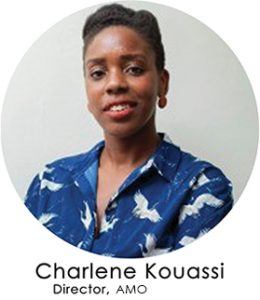
Before joining ITDP, Gashaw was the team leader of the transport and road network planning department for the city of Addis Ababa, Ethiopia for the past six years. His responsibilities included planning the city’s road network, leasing with stakeholders, and planning the city’s parking and terminal provisions. Gashaw has extensive experience as a consultant having previously worked with three consulting firms. He holds a Bachelors Degree in Urban and Regional Planning from Addis Ababa University and a Masters Degree in Urban Administration and Planning from the University of Seoul in Korea.
At ITDP Africa, Gashaw is a Country manager based in Ethiopia. working on different sustainable urban mobility projects in Ethiopia, mainly the non-motorized transport strategy, Bike sharing, and Sustainable urban mobility projects.
